V. Putin's proposal about the “delay of the referendum of May 11,” and the further fate of the so-called Donetsk and Luhansk People's Republics, which the Kremlin is trying to present as a new important “peacekeeping” initiative, essentially does not change the global plans of Moscow and the geopolitical situation around Ukraine, as the threat to national security of Ukraine remains real — the invasion of Russian troops onto the territory of Ukraine (1), external interference into the internal affairs of our country (2), direct external support to separatists and inciting them to actions aimed at undermining of the territorial integrity, national sovereignty and constitutional order of Ukraine (3), the RF's energy pressure on Ukraine (4), the targeted undermining of Ukraine's economic and defense potential (5), the massive information war against the Ukrainian state (6).
|
|
Having pushed away the Syrian, Iranian, North Korean and other crises, the Ukrainian question is now in the first position on the world's agenda, starting with the UN, NATO, the OSCE, the EU and other international organizations and ending with foreign policy priorities, of almost all the leading nations. International institutions and states have got united to make pressure on the state-aggressor and sponsor of the separatist movement in Ukraine, continuing to elaborate a coherent and coordinated list of mandated activities against Moscow. However, we must admit that there is no consensus (solely because of economic motives and due to Russian special services' activation of the “fifth column” in Europe) among the political and business circles of influential European countries (Germany, France, Italy and Spain) in using sanctions against Russia.
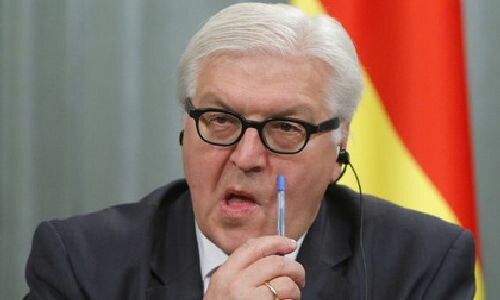
The plan for de-escalation of the situation and its resolving in Ukraine, consisting of five steps, has been proposed by the Foreign Minister of Germany Frank-Walter Steinmeier
The plan for de-escalation of the situation and its resolving in Ukraine, consisting of five steps, has been proposed by the Foreign Minister of Germany Frank-Walter Steinmeier: 1) immediate negotiations in the “Geneva-2” format; 2) conduct of Presidential elections in Ukraine on the 25th of May this year, which will democratically legitimate the authority of the new Ukrainian leadership and will help stabilize the political and economic situation in the country; 3) strengthening of the mediation role of the OSCE; 4 ) conducting a discussion on the constitutional reform in Ukraine with participation of representatives of all regions of the country and the public; 5) disarmament of non-state groups and leaving the captured public buildings.
At the same time, European institutions and some countries have doubts about the effectiveness of possible negotiations in the “Geneva-2” format. The reasons are as follows: on the one hand — Russia's unwillingness to grant Ukraine the opportunity to take advantage of the moratorium on the negotiations for the preparation and conduct of the presidential elections and, on the other hand — the forecasted Russian Federation's attempts to promote its own scenario of breakdown of the presidential elections in order to avoid legitimizing the Ukrainian authorities.
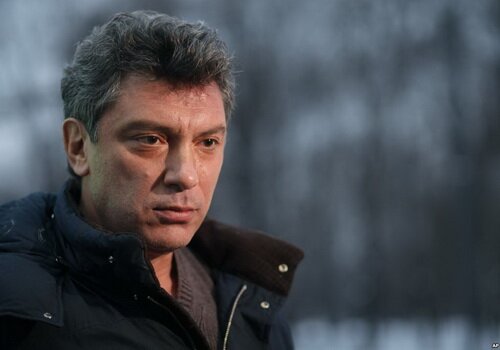
The leader of "Solidarity" Boris Nemtsov about the consequences of annexation of the Crimea: "When citizens feel that they have to pay out of their pockets for this adventure, will begin sobering"
http://www.golos-ameriki.ru/
Is B.Nemtsov right, prompting V. Putin's foreign supporters, Russian establishment, Ukrainian separatists, poisoned by the Russian propaganda his compatriots and citizens of Ukraine, to answer the following question: how would the Kremlin respond if on May 11 in Yaroslavl, Nizhniy Novgorod and Tatarstan there had been conducted a referendum in support of the act of state independence of Yaroslavl (Nizhniy Novgorod, Volga- Tatar) People's Republic? And further: would military units be sent to Yaroslavl region?; what would be the initiators of the referendum called on television — supporters of federalism or separatists and terrorists?; what would be the reaction of the Kremlin, if in response to Moscow's use of force neighboring states would called the Russian government a fascist junta?
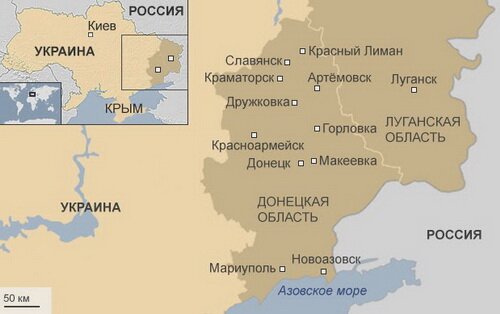
Eastern Ukraine
http://konan-vesti.blogspot.ru/
Following the logic of actions of the Kremlin's ruler, his nearest goal is disruption of the scheduled for the 25th of May 2014 Presidential elections as a factor in delegitimizing the “illegitimate” (according to Putin) Ukrainian authorities and accelerated formation in Ukraine of breakaway quasi-state formations as outposts for further division of our country. Experts' attitudes to the RF's leader's practical plans differ.
Based on estimates of Russian well-informed sources, the Kremlin considers three scenarios of the development of the situation in Ukraine:
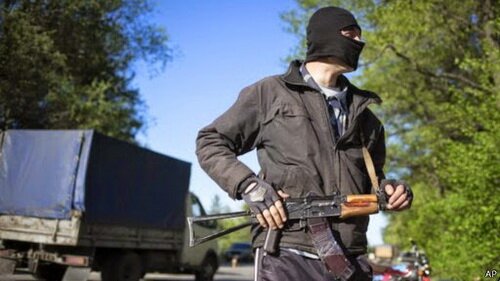
http://konan-vesti.blogspot.ru/
1) The Ukrainian government is successful enough to stabilize the situation in the troubled regions and inhibits the anti-terrorist operation in the hotbeds of terrorism and separatism, adjusts with local business elites, and other troubled regions of broad dialogue that allows you to hold early presidential elections and finally removed from the agenda the question of illegality of the Ukrainian authorities.
Under this scenario, Russia does not recognize the election results, referring to the identified significant irregularities in the electoral process in the southeastern regions of the state, as well as failure of the Geneva accords. The Kremlin will try to shift the emphasis in the activities aimed at easing Ukrainian statehood in trade and economic sphere (the next “customs blockade,” the gap further cooperative ties, termination/restriction of energy supplies and the like);
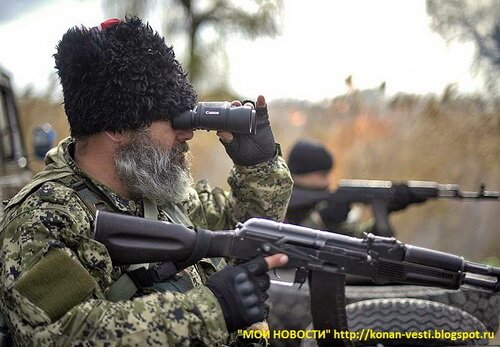
http://konan-vesti.blogspot.ru/
2) The lack of results from the ATO and further transition into a protracted conflict, including “guerrilla” phase. This will create the preconditions for the recognition or non-recognition of the legitimacy of the limited results of the presidential election not only Russia, but also the Western community due to the apparent deepening destabilization until the division of the country. In this context, can further direct/indirect support Russian separatist regions in order to force the Ukrainian government to negotiate a federalization of the state to Russian conditions;
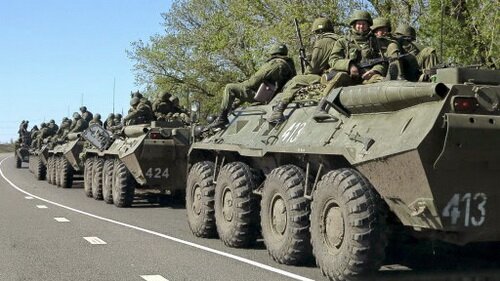
http://konan-vesti.blogspot.ru/
3) The possibility of Russian troops in the south-eastern regions of the Ukrainian state under the pretext of protecting Russian citizens and compatriots. Now the Russian side seeks appropriate background for this (media rhetoric, the formation of the Russian Federation in the community beliefs that Ukraine is burning civil war, as well as periodic outspoken appeals leading Russian politicians to military action).
At the same time, implementation of this option is constrained by the probability of entering the West more tangible economic and trade sanctions, as well as radically different as compared with the Crimea, the situation in the south and east of Ukraine.
In addition, not all of the Russian elite favor Putin expansionist plans. Of course, oligarchic environment Putin openly afraid of sanctions in the third level, but it does not significantly affect the adoption of Russian head of state decisions that certainly supported adepts hard line on Ukraine V. Surkov, S. Ivanov, S. Glaziev and other. However, some representatives of the Russian government (in particular, state technocrats A. Ulyukayev, A. Siluanov, A. Dvorkovich) in backstage conversations are increasingly expressing their dissatisfaction with uncompromising Kremlin policy toward Ukraine and the West, in fact nullifies the implementation of any economic program.
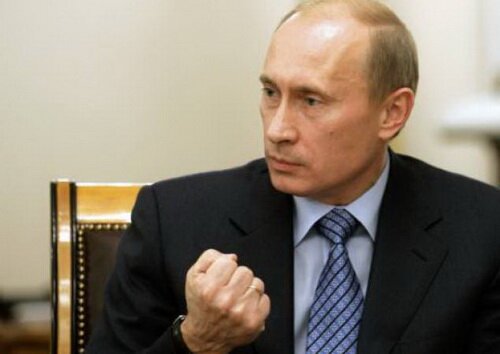
Additional efforts will be required from the President of the Russian Federation and to “convince” the leaders of Belarus, Kazakhstan, Azerbaijan, Tajikistan and Kyrgyzstan in the “legality” of the actions of Russia and pro-Russian forces in Ukraine. And then the Putin’s positions are also indisputable: taking into account the statements of some Russian politicians on the Rights of the Russian Federation to the northern region of the Republic of Kazakhstan, Astana is now seeking opportunities to increase funding for the military and intelligence services, their complete national manning, personnel trained in Kazakhstan, and not create agreeing with Russia and Belarus, a common Eurasian sky, is considering all possible delay in order not to sign an agreement on the formation of the Eurasian Economic Union.
Provocative actions of Russia in Ukraine and throughout the region (including pressure on Belarus) cause a negative reaction among representatives of the Belarusian authorities concerned to the presidential elections in Ukraine took place in a timely manner (25 May), and promised to recognize and cooperate with any them victory.
On the background of the Ukrainian crisis Azerbaijani experts are concerned that Russia activates dangerous socio-political processes in Azerbaijan, which can seriously threaten its sovereignty, territorial integrity and statehood. Specifies the use of the Russian Federation on the territory of the Republic of Azerbaijan approved in other countries of the former Soviet Union approaches to strengthen its influence. Available due to increased pro-Russian media, politicians and non-governmental organizations stiffness critical rhetoric about the activities of the Azerbaijani authorities, raising the level of the pro-Kremlin propaganda, mass distribution of the citizens of the Republic of Azerbaijan “St. George tapes” as well as the issuance of consular offices of the Russian Federation in the Republic of Azerbaijan on a simplified procedure Russian passports to residents of northern regions of Azerbaijan.
In spite of everything, and no matter how politicians and analysts call aggressor implemented scenario in Ukraine — “Bosnian”, “Georgian-Abkhazian”, “South Ossetian” or whatever — must always be kept in mind: to satisfy imperial ambitions and inadequate (painful) imagination of a world order and arrangement of the state of other countries one person uses the creeping annexation of the territorial sovereign state funding and direct military support regional separatism and terrorism. That is, the international security system collapses, which is why there is a direct threat to all humanity and the European community — in particular.
|
|
Russia does not abandon his further attempts to complicate the situation and influence the course of events, in particular, sparking a constitutional crisis in Ukraine with the prospect of turning our state in the decentralized, with a very weak confederation center, politically dependent on the Kremlin and economically controlled them.
This suggests that today “feeling messianism” in Putin is so strong that it is unlikely that he alone could keep their imperial aspirations. The Russian leader did not intend to rest on our laurels in the Russian-Ukrainian conflict, in particular, on the occupation of the Crimea. He will move on as much as the situation allows it.
Force Putin to take the opposite decision may primarily significant “increase in value” the continuation of the geopolitical plans. It may be possible only if a more determined resistance of the Ukrainian society, more effective actions of the Ukrainian power structures and more powerful (undermining the foundations of Russia's economic development and personal well-being Putinists) Western sanctions.

